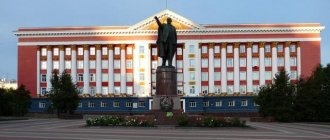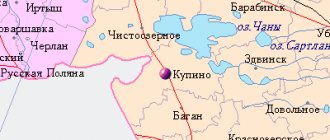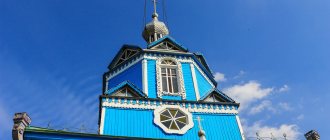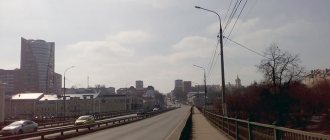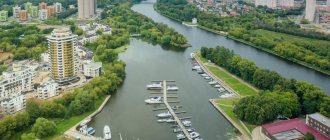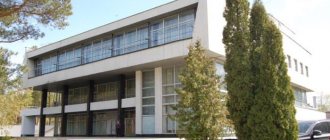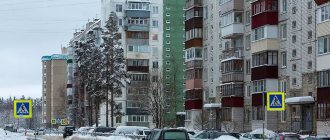Located in the northeast of the Moscow region, 7 km from Moscow and 2 km from the Yaroslavl highway.
Today, about 900 enterprises of various forms of ownership are registered in the city of Yubileiny, the main part of which are medium and small businesses. Representative offices of large banks have been opened. The main city-forming enterprises of the city are:
4 The Central Research Institute of the Ministry of Defense of the Russian Federation is the largest research institution of the Ministry of Defense, created in 1946, and carries out research work in the interests of the Strategic Missile Forces, in general the strategic nuclear forces and military space forces.
Research Institute of Space Systems is a branch of the federal state unitary enterprise “State Space Research and Production Center named after. M.V. Khrunichev" (Research Institute of KS). The area of activity is research and development work within the framework of the national space program.
Limited Liability Company "Information Security Center", which is engaged in theoretical and experimental research and work on the creation of technical means and the development of methods for information protection and control.
Autonomous non-profit organization "Center for Problems of Strategic Nuclear Forces" of the Academy of Military Sciences. The direction of activity is the interests of the country's security and its socio-economic development.
Closed joint stock company "EKA". The area of activity is the creation of new equipment and advanced technologies in the field of ecology, environmental protection, practical aviation and astronautics.
Closed joint-stock company "336 UNR". Area of activity: general construction works.
Story
Yubileiny is one of the youngest cities in the Moscow region.
The history of the future city begins in September 1939, when the Moscow Red Banner Military Engineering School was opened in Bolshevo, which was relocated to Leningrad in 1946. In its place, the 4th Research Institute of the Ministry of Defense (development of rocket and space technology) began to function in the same year. In the 1950s, construction of the first closed camp for military scientists was completed. In the 60s, a new closed military camp was built nearby, which began to be called the second. In 1972, the 50th Central Research Institute of Military Space Forces named after. M.K. Tikhonravova. In 1972, the military camps received the status of a closed workers' settlement and the code name Bolshevo-1.
In 1989, the village’s “closed” status was removed. On May 25, 1992, the village of Bolshevo-1 was classified as a city of regional subordination with the name Yubileiny city. In 1997, two central research institutes were merged into one.
Honorary citizens of the city[ | ]
- Alekseev Eduard Viktorovich [ source not specified 3664 days
] - Major General, Doctor of Technical Sciences, Professor, Honored Worker of Science and Technology of the Russian Federation. Head of the 50th Central Research Institute KS MO from 1988 to 1993. From 1999 to 2007, he headed the Council of Veterans of War, Labor, Armed Forces and Law Enforcement Agencies of the city of Yubileiny - Bezrukov Alexey Semyonovich[23] - chief physician of the 2nd Central Military Clinical Hospital named after P.V. Mandryk, colonel of the medical service, Honored Doctor of the Russian Federation.
- Volkov Evgeniy Borisovich[23] - lieutenant general, doctor of technical sciences, professor, honored worker of science and technology of the RSFSR, Hero of socialist labor. Head of NII-4 MO from 1970 to 1982.
- Volkov Lev Ivanovich[23] - Lieutenant General, Doctor of Technical Sciences, Professor, Honored Worker of Science and Technology of the RSFSR, State Prize Laureate. Head of the 4th Central Research Institute of the Moscow Region from 1982 to 1993.
- Golubov Boris Ignatievich[23] - Chairman of the executive committee of the village council of the village of Bolshevo-1 since 1990. Head of the Yubileiny city administration since 1992. Head of the city of Yubileiny from 1996 to 2003.
- Dvorkin, Vladimir Zinovievich[23] - major general, doctor of technical sciences, professor. Head of the 4th Central Research Institute of the Moscow Region from 1993 to 2001.
- Mardirosova Elizaveta Georgievna[23] - general practitioner at the city clinic from 1980 to 1998. Head of the second therapeutic department from 1999 to 2003.
- Ziborova Anna Danilovna - chairman of the executive committee of the village council of deputies of the village of Bolshevo-1
- Menshikov Valery Aleksandrovich[23] - Major General, Doctor of Technical Sciences, Professor, Honored Scientist of the Russian Federation. Head of the 50th Central Research Institute KS MO from 1993 to 1997. Director of the Research Institute of CS named after A. A. Maksimov - a branch of the State Research and Production Space Center named after. M.V. Khrunichev from 1998 to 2011.
- Meshcheryakov Ivan Vasilievich[23] - Lieutenant General, Doctor of Technical Sciences, Professor, Honored Worker of Science and Technology of the RSFSR, State Prize Laureate, Hero of Socialist Labor. Head of the 50th Central Research Institute KS MO from 1983 to 1988.
- Mitropolsky Sergei Fedorovich[23] - colonel, veteran of the Great Patriotic War.
- Sokolov Andrey Illarionovich[23] - lieutenant general, doctor of technical sciences, laureate of the Lenin Prize. Head of NII-4 MO from 1955 to 1970.
- Tikhonravov Mikhail Klavdievich[23] - engineer, creator of the first artificial Earth satellite, Hero of Socialist Labor.
- Chernyshev Nikolai Gavrilovich[23] - engineer-colonel, doctor of technical sciences. Head of the department of Research Institute-4 of the Moscow Region from November 1946 to January 1953. Pioneer of domestic rocket science. A crater on the Moon is named after him.
Infrastructure
The main enterprises of the city:
The city has two gymnasiums, a lyceum, two secondary schools, an art school, a music school, and a children's school. In 2007, the Orbita stadium and the Chaika swimming pool were opened. There is a clinic and hospital in the 3rd microdistrict.
Garrison officers' house. History and Art Museum, opened in 1998 and has a collection of military vehicles.
The newspapers “Sputnik” and “Bolshevskie Vesti” are published (2008). TV channel "TV-Yubileiny" (MU "Information Center") since 2001.
Transport
Direct railway connection with Moscow, Yaroslavsky station (45-50 minutes by commuter train, 28-33 minutes by electric train "Sputnik" from Bolshevo station), bus route 499 to the VDNKh metro station. On the eastern border of the city there is the third platform of the Bolshevo station (Fryazino direction). Local buses connect Yubileiny with neighboring Korolev.
Entertainment
The city has several nightclubs such as Atoll, Galaxy and Tango. There is also a closed VIP club “BTI”, in which such stars as Timati, Ivan Dorn, Yidaw, MC American Psycho and Ivan “Chromosom” Agefiev were seen at different times.
Internal division[ | ]
- Town 1: Streets of Heroev Kursantov, K.D. Trofimova, M.K. Tikhonravova, Garage deadlock, Institutsky proezd.
- Town 2: Streets A. I. Nesterenko, A. I. Tikhomirova, Bolshaya Komitetskaya, Military Builders, Zavodskaya, I. D. Papanin, Komitetskaya, Leninskaya, Malaya Komitetskaya, M. M. Glinkin, Mayakovsky, M. K. Tikhonravov , Leninsky and Shkolny passages.
- Town 3: Streets A.I. Sokolov, Leninskaya, Lesnaya, Malaya Komitetskaya, Mayakovskogo, Parkovaya, Pionerskaya, Pushkinskaya, M.K. Tikhonravova
Media[ | ]
The newspapers “Sputnik”, “Bolshevskie Vesti” and “City Assembly” are published; the last two publications have not been published since the March 2012 elections.
The TV channel "TV-Yubileiny" (MU "Information Center") operated from 2001 to 2012. The TV channel was closed due to the founder - the head of the city of Yubileiny - changing the form of establishment from MU to UIA and a complete exclusion from the Charter of journalistic activity. Television broadcasting is provided by the Municipal Autonomous Cable Institution of Yubileiny and Pentabox LLC.
Infrastructure
The main enterprises of the city:
— 4 Central Research Institute of the Ministry of Defense of the Russian Federation,
- Research Institute of Space Systems - branch of the State Research and Production Space Center named after. Khrunicheva,
other research and construction organizations.
The city has three gymnasiums, a lyceum, a comprehensive school, an art school, and a children's school. The stadium was opened in 2007. In microdistrict 3 there is a clinic and a hospital is being built.
There is a garrison officers' house and a historical and art museum (opened in 1998, has an impressive collection of military vehicles).
The newspapers “Sputnik” and “Bolshevskie Vesti” are published (2008).
Links
Useful
See what “Yubileiny (Moscow region)” is in other dictionaries:
Moscow region - Moscow region. 1. Losiny Ostrov National Park. Abbreviations: Ar. - Arkhangelskoye G. - Gorki Leninskie DZ. — Dzerzhinsky D. — Dolgoprudny Zh. — Zheleznodorozhny Zhos. — Zhostovo K. — Korolev L. —… … Dictionary “Geography of Russia”
Moscow region - Coordinates: 55°42′ N. w. 36°58′ E. long / 55.7° north w. 36.966667° E. d. ... Wikipedia
Moscow region: Khimki - Russian Federation Federal districts: Far Eastern • Volga • Northwestern • North ... Accounting encyclopedia
Moscow Region - Formed on January 14, 1929. Area (excluding Moscow area) 46 thousand km2. Population (excluding Moscow) 6644 thousand people (1995). It is located in the center of the European part of Russia, between 54 and 57° north latitude and between 35 and 40° east longitude. Distance from... ...Moscow (encyclopedia)
Kaliningrad (Moscow region) - Naukograd[1] Korolev Podlipki, Kalininskoe, Kaliningrad Flag Coat of Arms ... Wikipedia
Korolev (Moscow region) - Naukograd[1] Korolev Podlipki, Kalininskoye, Kaliningrad Flag Coat of Arms ... Wikipedia
Chekhov (Moscow region) - This term has other meanings, see Chekhov (meanings). City of Chekhov Flag Coat of Arms ... Wikipedia
Bekasovo (Moscow region) - Village Bekasovo Country RussiaRussia ... Wikipedia
Zhukovsky (Moscow region) - This article lacks links to sources of information. Information must be verifiable, otherwise it may be questioned and deleted. You can... Wikipedia
Voskhod (Moscow region) - Urban settlement Voskhod (ZATO) Flag Coat of Arms ... Wikipedia
Source
Population[ | ]
| Population | |||||||
| 1995 | 1996[10] | 1998[10] | 2000[10] | 2001[10] | 2002[11] | 2003[10] | 2004 |
| 34 000 | ↘26 500 | ↗27 000 | ↗27 500 | ↗27 600 | ↗30 837 | ↘30 800 | ↗31 000 |
| 2005[10] | 2006[10] | 2007[10] | 2008[10] | 2009[12] | 2010[13] | 2011[10] | 2012[14] |
| ↗31 400 | ↗31 600 | ↗32 100 | ↗32 300 | ↗32 492 | ↗33 237 | ↘33 200 | ↗33 381 |
| 2013[15] | 2014[16] | 2015[1] | |||||
| ↘33 078 | ↘32 940 | ↘32 737 | |||||
Living in Yubileiny: calling the streets “towns” and rooting for Papaninskaya Dacha
Yubileyny has changed several names over its short history, and in 2014 it turned from a city into a microdistrict of the Korolev urban district. The indigenous residents of Yubileiny from military families still call the microdistricts “small towns”, the local recreation center - the House of Officers, and the shopping center - Voentorg, and are also proud of their intelligent neighbors - the kings. Native resident Ekaterina told RIAMO about how modern Yubileiny lives and what has changed after the merger with Korolev.
Children of a military camp
Our family ended up in Yubileiny in 1986, where my father, a military man, was given an apartment. Then our city was called the village of Bolshevo-1, and it became Yubileiny only in the early 90s. Well, now we are the Korolev microdistrict. By the way, until 1986 Bolshevo-1 had the status of a closed village.
The indigenous inhabitants of Yubileiny are the children and grandchildren of the military, and the kings are the descendants of scientists and workers in the space industry. We have always prided ourselves on the fact that intelligent people live in both Yubileiny and Korolev.
We still have a lot of children and grandchildren of military personnel; it seems to me that this is approximately two-thirds of the population. When I meet new people, it turns out that they have been living here since the 80s, and also from military families.
I remember the time when there were no street names in Yubileiny, but only “small towns,” until 1997. “Town three, house such and such” - and everyone understood what was going on. There were four towns in total. Many people, including me, can still name not the street, but the town number as a reference point.
House of Culture, where the premiere of “Officers” took place
The main street of Yubileiny is Tikhonravova Street. It is named after the scientist and designer in the field of astronautics and rocketry Mikhail Tikhonravov, the creator of the first Soviet liquid-propellant rocket.
The main attractions are located on this street, among them the garrison House of Officers (now the Yubileiny Palace of Culture), built in the 60s. This building once hosted the premiere of the legendary film “Officers” of 1971, which is loved by all military personnel, starring the legendary Vasily Lanov, Alina Pokrovskaya and Georgy Yumatov.
Once upon a time, life was in full swing here; there were kilometer-long queues for tickets to film premieres. Nowadays, various “travelling” circuses put on shows in the old “old-school” cinema hall.
Here, on Tikhonravova, there is a modest local history museum dedicated to the recent history of Yubileiny.
Papaninskaya dacha
The main cultural value of Yubileiny is Papaninskaya dacha. It belonged to the famous Arctic explorer and twice Hero of the Soviet Union Ivan Dmitrievich Papanin. But, alas, you cannot show the legendary Papanin’s dacha to children and tourists - for many years this territory and historical buildings have been hidden behind a solid fence.
Today, the vast territory of the Papaninskaya dacha is federal property. As far as I know, several private cottages have already been built there. For many years, residents of Yubileiny have been fighting for a park to be built on this territory and a museum to be opened in memory of the outstanding polar explorer. But so far no decision has been made in favor of the residents.
My relative heard Papanin himself, speaking many years ago from the stage in front of city residents, talking about how he wanted to leave his dacha to the city. And such a place would really become the heart of the city, we really miss this.
In Yubileiny, unlike Korolev or Mytishchi, there are no decent parks and cultural centers. A small square with an ice cream stand and a half-abandoned park near the Bolshevo platform, which was chosen by tired workers with beer - these are all the places to relax in Yubileiny.
On the territory of the Papaninskaya dacha it would be possible to make an excellent place for family recreation and a cultural center dedicated to the life of the legendary man Ivan Papanin. But residents, continuing to discuss this topic, are almost desperate and do not hope for a successful outcome.
Source
